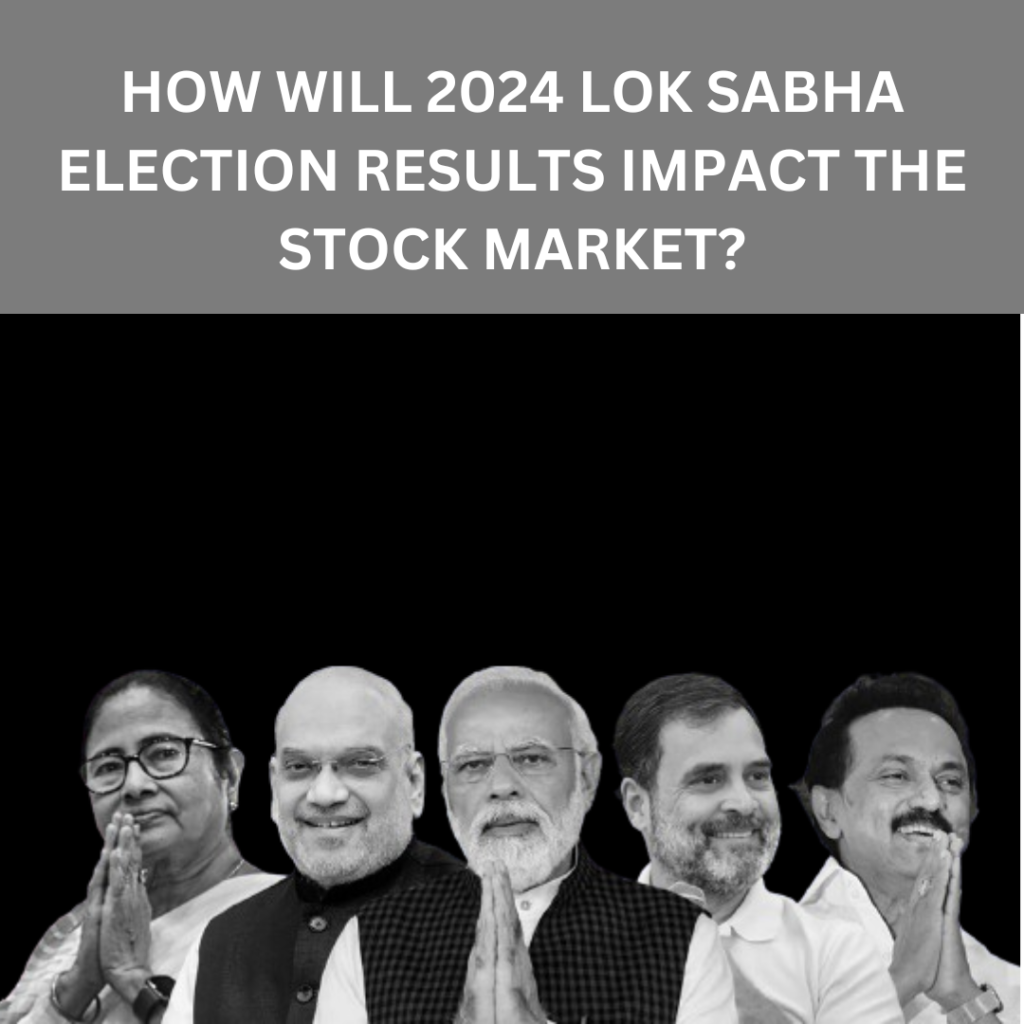The stock market will be affected by the 2024 Lok Sabha election results, especially if the BJP or NDA wins.

INTRODUCTION
General elections in India have a big impact on the stock market and investors compared to state elections. Usually, before the elections, the stock market tends to go up, giving good returns to investors. Different parts of the stock market respond differently to elections depending on how much they’re affected by government rules and regulations. When election results create a positive feeling and the government seems stable, foreign investors may become more interested in investing in the stock market, which can help it grow.
IMPACT ON THE INDIAN ECONOMIC MARKET AFTER THE ELECTION RESULTS
In the past, Indian stock markets haven’t reacted much on the day election results are announced. This means that the immediate effect of elections on the stock market has been limited, except for 2004 and 2009. In 2004, the market crashed because the Congress-led UPA unexpectedly won. However, in 2009 and 2014, the markets went up a lot. In 2019, the markets went down a bit when the results were announced. This was probably because people already expected the BJP-led NDA to win, and other economic factors also influenced how investors acted.
EFFECT AFTER EXIT POLLS
The Nifty, a measure of the Indian stock market, saw a significant surge of 600 points right from the opening bell. This spike followed the release of exit polls, which indicated a strong possibility of the NDA securing over 350 seats in the Lok Sabha Elections. Alongside the Nifty, the Sensex, another key stock market index, also experienced a notable rise of 2000 points during the initial trading session.
Among the notable beneficiaries of this market upswing were stocks belonging to Public Sector Undertakings (PSUs) and companies within the Adani Group conglomerate. Investors showed keen interest in these sectors and companies, resulting in substantial gains for their respective stocks.
How did the Stock Market Perform in the Last Four General Elections?
In 2004, before the election, Nifty went up by 26.70%. After the election, Manmohan Singh’s UPA coalition won.
In 2009, Nifty went up by 37.80% before the election. After the election, Manmohan Singh’s UPA coalition stayed in power.
In 2014, Nifty went up by 51.74% before the election. After the election, the BJP got a lot of seats, and Narendra Modi became Prime Minister.
In 2019, Nifty went up by 55.80% before the election. After the election, the BJP, led by Narendra Modi, won again.
2004 – UPA Victory Surge
Following the victory of the UPA, led by Manmohan Singh, the stock market witnessed a notable surge. The Nifty index showed a remarkable gain of 26.70% in the six months leading up to the election. This optimism stemmed from investors’ confidence in the continuity of economic reforms under the UPA government.
2009 – Congress Retains Power
With the UPA retaining power under the leadership of Manmohan Singh, the stock market once again displayed bullish behavior. Before the election, the Nifty surged by 37.80%, driven by expectations of stable governance and pro-business policies.
2014 – BJP Comes to Power
The victory of the BJP-led NDA and the ascension of Narendra Modi as Prime Minister sparked a positive response in the stock market. The Nifty index soared by 51.74% in the pre-election period as investors welcomed the prospects of a pro-reform agenda and decisive leadership.
2019 – Modi Wins Again
In 2019, the re-election of Narendra Modi and the BJP-led NDA witnessed a significant surge in the stock market. The Nifty climbed by 55.80% ahead of the election, fueled by confidence in Modi’s leadership, his reform initiatives, and the promised stability.
Which Sectors are going to Boom after 4th June?
After the election results are announced, the new government will start putting its plans into action. Here’s what’s expected to happen in some key sectors after June 4th:
1. Power Sector
The government wants to improve India’s electricity system by investing around ₹4.75 lakh crore by 2027. They aim to increase the country’s power capacity to 900 GW by 2032, which is a big jump from the current 426 GW.
2. Infrastructure
If the BJP stays in power, we can expect more projects to develop things like roads, trains, and waterways. This might include big projects like bullet trains and expanding highways to connect more cities.
3. Real Estate
The housing market is doing really well because a lot of people want to buy houses, and the government is helping by spending more money on this. Right now, there aren’t enough houses to meet the demand, so prices are going up. In 2023, the number of houses sold went up by 25%, almost doubling in just three years.
4. Tourism
More people are expected to visit India in the next few years, which means the hotels will be busier. The price for a hotel room has gone up to ₹6900 per night, even higher than before the COVID pandemic. More rooms are getting filled up, with around 66% being occupied, and hotels are making more money per available room, with revenue going up to ₹4540.
4. Electronics System Design & Manufacturing (ESDM):
The electronics market in India is growing a lot. The government is giving big incentives and a ₹76,000 crore grant to help Indian companies make more electronics instead of importing them. This should help reduce the amount of money we spend on imports and boost our own electronics industry.
How did Investors decide what to Buy & what to Sell?
Investors think carefully about what they want to buy and sell in the stock market. Here are some things they consider during elections:
Political Stability: Investors like leaders who they think will keep the economy stable. They might buy stocks from companies that they think will do well if the government stays the same.
Policy Expectations: Investors look at what different parties promise to do if they win. They might buy or sell stocks based on what they think will happen to certain industries, like defense or tourism, if a new party comes into power.
Foreign Investment: Investors also think about how elections might affect people from other countries investing in India. If the government looks like it will stay stable and make good policies, foreign investors might want to buy more stocks here.
Long-Term Outlook: Some investors don’t worry too much about what happens during elections. They focus on companies or industries that they think will do well in the long run, no matter who wins.
Conclusion
Thinking about 2024, it seems like India’s economy will keep getting better, even if there are some challenges. Usually, during election years, the stock market does well, but it’s important to be careful and safe with your investments. Investing in smaller companies might give you more money, but bigger companies could be safer. When the stock market goes down, it’s a good idea to take advantage of that and buy stocks. Just remember your long-term goals and be ready to change your investment plan if needed.
Click here to learn the Understanding S&P BSE SENSEX INDEX
New Options Trading Software by Spider is here, Try GChart demo for free. Register Now
If you’d like to know how we analyze the market and provide accurate levels every day. then click on the Free Demo button below and change your trading life for good. 5X returns are possible in options trading If you have Spider Software in your trading system.
Disclaimer: The information provided in this Blog is for educational purposes only and should not be construed as financial advice. Trading in the stock market involves a significant level of risk and can result in both profits and losses. Spider Software & Team does not guarantee any specific outcome or profit from the use of the information provided in this Blog. It is the sole responsibility of the viewer to evaluate their own financial situation and to make their own decisions regarding any investments or trading strategies based on their individual financial goals, risk tolerance, and investment objectives. Spider Software & Team shall not be liable for any loss or damage, including without limitation any indirect, special, incidental or consequential loss or damage, arising from or in connection with the use of this blog or any information contained herein. ![]()





